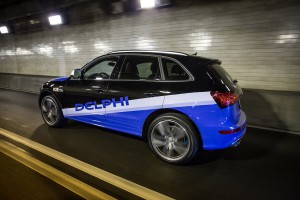
Delphi plans to show off its new CSLP system featuring new Intel computer chips at the upcoming CES in January in Las Vegas.
Pretty soon your car may be “intel inside” as Delphi and Mobileye N.V. are partnering with Intel to use the company’s computer chips for its in-development autonomous vehicle system.
The new system, which is called Centralized Sensing Location and Planning, is expected to be available by 2019, according to Delphi officials. Intel is slated to deliver the chips late next year. Able to handle processing more than 12 trillion operations a second, they are the final piece to autonomous puzzle.
“We think they will be a great supplier for us,” Glen DeVos, vice president of Delphi’s services business unit told Automotive News. “For us, it’s a big step forward. It will allow us to accelerate development.”
The new chips are what will allow the system to sort through all of the data it receives and make decisions about steering, acceleration, braking, etc. The trio expects to develop a system that costs less than what automakers can do it for alone: about $5,000 per car when it’s introduced.
That figure will likely drop as it becomes more commonplace, DeVos told Bloomberg News.
(Samsung spends $8 billion to buy mobile tech giant Harman. Click Here for the story.)
“For us, it’s a big step forward because it allows us to really accelerate the development of the overall program,” he said of the deal.
Part of that cost savings will come from less reliance on costly lidar sensors, which bounce light off objects to assess shape and location, and more on cameras and radar, which are less expensive. The result, they say, is a more affordable system for carmakers that lack resources to develop it.
Tesla, which already claims its vehicles are fully autonomous and merely awaits federal approval before activating the systems, uses a similar approach: less reliance on lidar and more on camera and radar.
(Investors betting big on autonomous technology. Click Here for the story.)
This approach makes sense as Delphi already produces its own radar and cameras, although it does have a deal in place with Quanergy Systems Inc. – a Silicon Valley startup – to develop a low-cost lidar system. Mobileye is a top developer of obstacle-detection software. Coalescing all the information will come down to Intel’s chips.
The Intel chips will run decision-making software developed by Ottomatika Inc., a Pittsburgh-based startup acquired last year by Delphi. The industry will get its first look at the new system at the Consumer Electronics Show this January in Las Vegas as Delphi will show it off a 6.3-mile closed-loop course.
The Troy, Michigan-based supplier will test its new technology in six self-driving vehicles to be used in a ride-hailing service next year in Singapore. Delphi also has confirmed that it plans to launch ride-hailing road tests in other cities, too.
(To see more about Qualcomm’s $38 billion buy-in on autonomous vehicles, Click Here.)
Delphi’s already shown the capability to produce an autonomous vehicle. Last year it sent an Audi about 3,500 miles from San Francisco to New York in self-driving mode.
